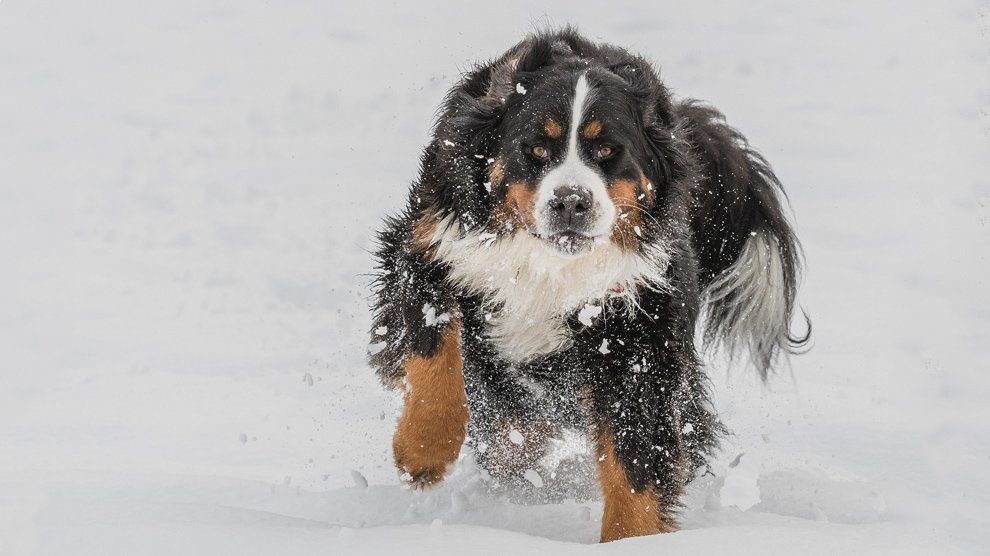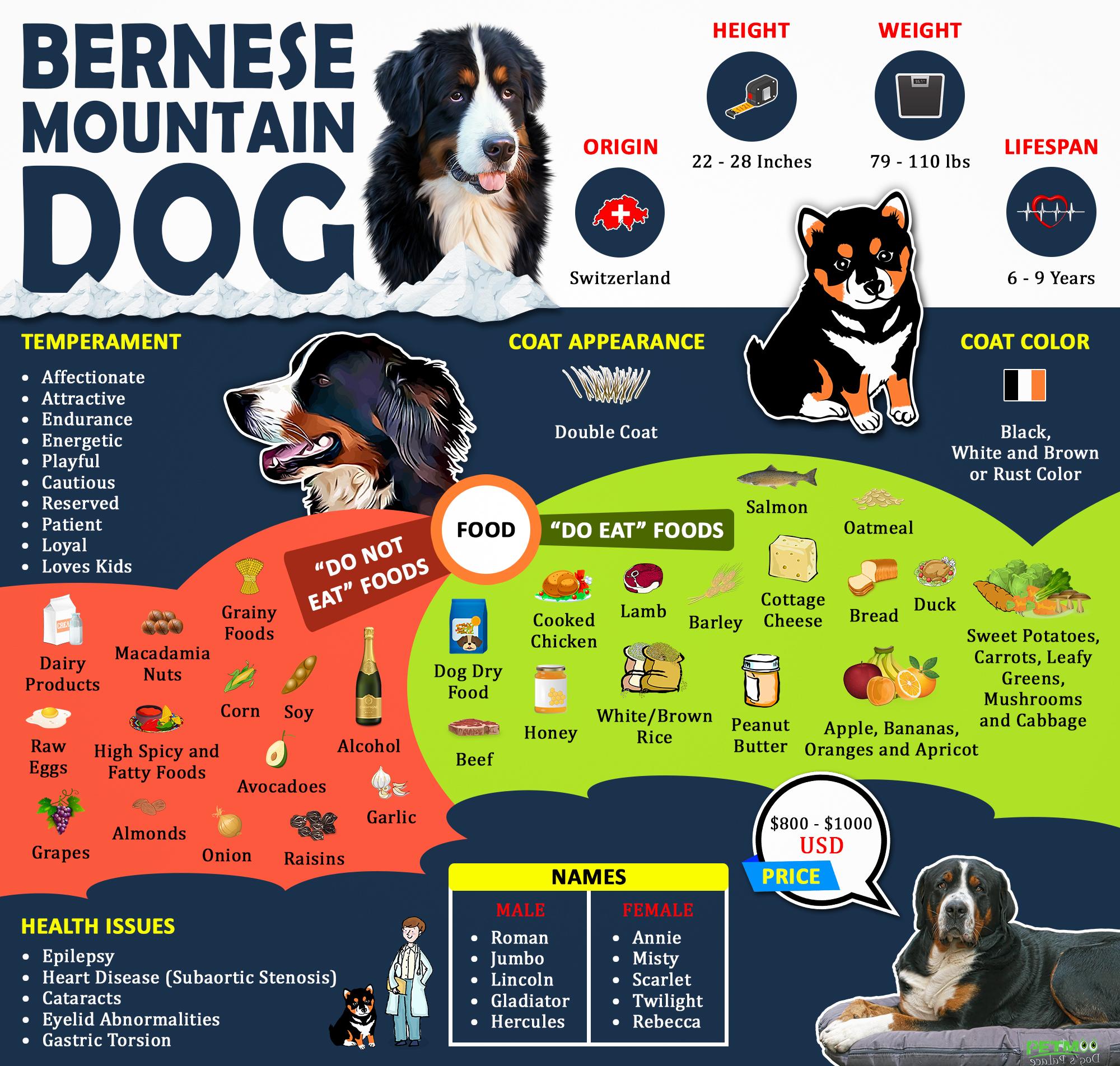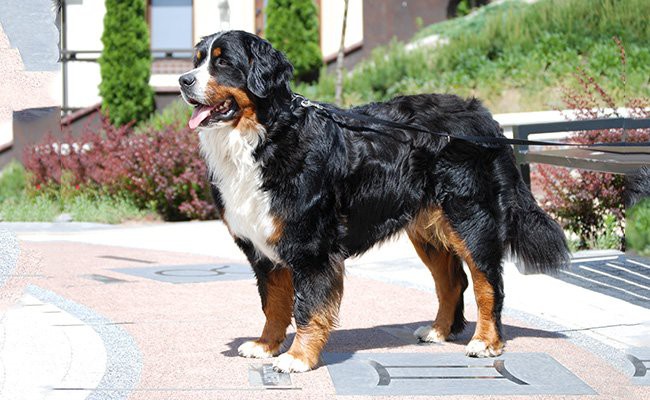Dog Pregnancy Calculator And Timeline
Bernese mountain dog originated from Switzerland is mainly bred for herding cattle, pulling carts, drafting animals, and guarding properties.
Bernese is one of the four important mountain dog breeds that worked in the canton of Bern.
Canton of Bern is a large agricultural area where dairy production is done and Bernese mountain dog was recognized in 1907. Let’s learn facts about the Bernese Mountain Dog Puppies, the great companion, and working dog breed.
Bernese Mountain Dog Facts
Coat And Color Of Bernese Mountain Dog
Bernese Mountain dog is a large dog with a tri-colored coat texture comprising of black, white, and brown or rust colors.
This dog has a double coat: an outer coat that is lengthy and also a woolly undercoat. Majorly, the dog’s body is mostly covered with black hair along with rust and bright white colors.
Generally, the Bernese Mountain has a white marking on his chest, a white color between the eyes that appears like a waterfall from the mountaintop, and a white mark at the tip of his tail.
Bernese Mountain Dog Appearance
Bernese Mountain dog is a popular farm dog that is stocky built (heavy) in appearance. The dog is also well balanced and has a wide chest.
By nature, its eyes are quite dark and very expressive. Normally, this dog has a low-hanging tail and rarely straightens when it is exciting. The female dogs appear a trifle smaller than the male dogs.
Bernese Mountain Dog Size
The normal height of a male Bernese Mountain dog is 64-70 cm while the height of a female dog is 58-66 cm. In terms of body weight, a normal Bern will weigh between 38 to 50 kg whilst the female usually weighs between 36 to 48 kg.
Bernese Mountain Dog Lifespan
The average lifespan of a Bernese mountain dog is 6 to 9 years if it maintains normal health and grown in a reasonably healthy environment.
Interesting Facts
There is a historical record which states that a Bernese mountain dog had lived up to 15 years old (which is well beyond its average lifespan).
The actual purpose of breeding this dog was to use it as a guard dog for protecting the farm properties and for herding cattle.
Berner dogs in America regularly participate in the carting competition conducted by the Bernese Mountain Club of America.
Compared with other dog breeds, Bernese mountain dogs have slow mental maturity.
These dogs can entertain their owners and mostly, even responds well to laughter.
Bernese mountain dog is such a strong dog wherein it can pull the load that is even 10 times more than its own weight.
The gestation period of a Bern dog is 61 days and on average, it can deliver at least 8 puppies.
It is peculiar to learn that Bernese dogs in spite of being such big hard-working dogs do not like water.
Bernese mountain puppies are also trained to act in movies, commercials, and television shows.
Celebrities who own/owned a Bernese Mountain Dog
- Hillary Duff – American singer, songwriter, and actress
- Chelsea Handler – American actress, comedian, writer, and television host
- Sarah Michelle Gellar – American actress, producer, and entrepreneur
Bernese Mountain Dog Food
The diet for a Bernese Mountain dog must contain a good amount of proteins and fats from good sources.
According to AAFCO dog food nutrient specifications, it is best advised to give the following foods for a Bernese Mountain dog.
Foods that a Bernese Mountain dog eats
- Commercial leading brand of dog dry food
- Cooked Chicken
- Salmon Fish
- Beef
- Lamb
- Duck
- White/Brown Rice
- Barley
- Oatmeal
- Bread
- Peanut Butter
- Cottage Cheese
- Honey (limited quantity)
- Vegetables like sweet potatoes, carrots, leafy greens, mushrooms, and cabbage
- Fruits such as Apple, Bananas, Oranges, and Apricot
“Do not Eat” Foods
- Grainy foods
- Dairy Products
- Alcohol
- Macadamia Nuts
- Soy
- Corn
- Raw eggs
- Avocadoes
- Grapes
- Raisins
- High Spicy and Fatty Foods
- Onion
- Garlic
- Almonds
Bernese Mountain Dog Temperament
Bernese mountain dogs are very affectionate and loyal to their family members. These energetic and playful dogs are good with children. They are cautious by nature and make good guard dogs too. However, this attractive and mesmerizing breed is a reserved one.
Bernese Mountain Dog Price
The average price of a Bernese Mountain puppy in the USA is $800 to $2500. However, the well-bred high-quality pup can be available at a price of $1500 to $5000.
You can buy premium quality Bernese Mountain puppies in the UK market from experienced professional breeders at a price range of £1500 to £1800.
The average price of a Bernese Mountain puppy can be $500 to $1000 and even slightly higher.
Bernese Mountain Dog Health Issues
1. Epilepsy
Symptoms
- Collapsing
- Stiffness
- Drooling
- Foaming at the mouth
- Teeth chomping
- Head shaking
- Muscle twitching
- Jerking
- Loss of consciousness
- Overall body weakness
Causes
- Drastic variation in blood sugar levels (low or high)
- Accidental eating of some poisonous food
- Liver Disease
- Kidney Disorder
- Anemia
- Encephalitis
- Electrolyte problem
- Head Injury
- Stroke
- Brain Cancer
Treatment
- First, approach the veterinary doctor after a few minutes of the dog getting affected by seizures.
- The dog owner must completely reveal all the details about the health problems of the dog.
- The revelation of diseases by the owner that his dog suffers which may be liver or kidney disorder and the frequency of seizure attacks. The vet will decide on the medication course.
- If the vet prescribes anti-seizure medications, then follow the pattern of administering such medication, accordingly.
- The vet could advise you to give medicines like Phenobarbital and Potassium Bromide for your dog.
- Apart from medication, the veterinarian might recommend dietary changes for your dog to ensure that it consumes nutritious food.
- Doctors mostly prescribe some dietary and nutritional supplements. The dog owner can know from the vet about the best foods to give to the dog.
2. Heart Disease (Subaortic stenosis)
Symptoms
- Showing lethargy
- Avoiding exercise
- Breathing difficulty or rapid breathing
- Heart murmur
- Arrhythmia
- Low blood pressure
- Feeling weak
- Fainting
- Weak pulse
- Collapse
Causes
- Congenital (at birth), factor, owing to hereditary reasons
- Low blood flow through the heart
- Undue stress to the heart
Treatment
Based on the condition or stage of the disease, needful treatment is given.
The normal treatment methods used for treating subaortic stenosis (heart disease) includes:
- Medication – Generally, medicines given for subaortic stenosis include beta-blockers such as atenolol. After completely reading the condition, a vet could even prescribe some other medications.
The prime focus of these medications is to lessen the stress levels of the dog’s heart. - Surgical methods – Balloon catheterization is a usually followed technique where a catheter will be inserted into a balloon at the tip of the heart.
This balloon will enable the constricted or narrow section of the heart to open up and pave the way for the smooth flow of blood. - Angioplasty – A novel form of treatment intended to lessen the stretch or excess strain of the heart and also the effect of the injury in the blood vessels.
Angioplasty is minimally invasive than surgery.
3. Cataract
Symptoms
- The appearance of a bluish-white film on either one eye or both the eyes
- Symptoms of blindness can occur in an affected dog where:
- The dog will accidentally bump on the furniture and door frames
- Barking at lifeless objects
- Awkward behavior
- Slow cautious walk
- Walk with the nose on the ground
- Struggle to find its bowls and toys
Causes
- Hereditary
- Eye Injury
- Diabetes mellitus
- Aging
- Uveitis
- Hypocalcemia
Treatment
Dogs that suffer cataracts due to genetic reasons or have diabetes will not be operated on. The surgical method is the only way to cure cataracts.
The vet will press for a quick cataract operation in healthy dogs because complications like pain and inflammation of the eyes, glaucoma, or complete blindness will arise.
Surgery will be undertaken by:
- Removal of the lens – The damaged lens is removed from the capsule in the eye globe and replaced with a plastic or acrylic intraocular implant
- Removal of lens and capsule – Both the capsule and the lens will be removed from the eye globe. The lens is replaced with a plastic intraocular implant
- Phacoemulsification – This process is about the emulsification of the eye lens through the application of ultrasonic waves. Aspiration technique i.e. the method of suction through the needle is applied to remove the emulsified lens.
Post-surgery, isotonic solutions are applied to the dog’s eyes for 3-4 weeks. However, oral antibiotics and painkillers could even be prescribed by the vet for these dogs that have undergone cataract surgery.
4. Eyelid abnormalities
Symptoms
- Keeping the eyes closed
- Squinting
- An abnormal coloring of the eyes
- The extremely high number of involuntary winking of eyes
- Excessive tearing
- Itching of the eyes
- Inflammation of the eyelid/s
- Sores on the cornea
Causes
- Hereditary reasons
- Protrusion of the eye due to:
- Pain in the eye socket
- Paralysis of the facial nerves
5. Gastric Torsion
Symptoms
- Difficulty in vomiting or not being able to vomit
- Restlessness
- Breathing difficulty
- Inability to move
- Drooling
- Panting
- Extreme Bloating
- Abdominal pain
- The rapid rate of heartbeat
- Weakness
- Collapse
Causes
- Eating food from a bowl at a higher level
- Quick eating
- Taking one large meal on a daily basis
- The high amount of drinking or eating
- To involve continually in doing activities like running or playing after eating
- Stress
Treatment
A vet will decide on the course of treatment based on the level or stage of gastric torsion. Usually, medications like antibiotics, steroids, and IV fluids are given for dogs that are in a state of shock.
Thereafter, pressure built up in the stomach of the dog will be released by way of inserting a tube into its throat that will go down to its stomach.
In case if the vet finds that the dog has a twisted stomach that disallows the tube to pass through. He will pierce a hollow needle on the dog’s belly that will go into its stomach.
To correct the twisted stomach and resurrect it to the usual place, the vet will perform surgery. The doctors perform the surgery to ensure that the dog does not boat again.
Names For Your Bernese Mountain Puppy
| Male Dogs | Female Dogs |
|---|---|
| Roman | Annie |
| Jumbo | Cyan |
| Samson | Ebony |
| Jupiter | Misty |
| Boone | Rain |
| Lincoln | Scarlet |
| Chubby | Twilight |
| Dragon | Rebecca |
| Muscles | Maggie |
| Gladiator | Harley |
| Hercules | Samantha |
| Winston | Vesta |
Bernese Mountain Dog Breeders
Click here to find the Bernese mountain dog breeders in your neighborhood in the USA.
Bernese Mountain Dog FAQs
Do Bernese Mountain Dogs Shed?
Bernese mountain dogs are double-coated dogs and shed moderately throughout the year. They shed more during spring and fall. Daily brushing and regular grooming will help control shedding and keep the coat healthy and clean. Regular bathing with a good pet-friendly shampoo will keep your dog look at its best.
How Long Do Bernese Mountain Dogs Live?
Bernese mountain dogs live a relatively shorter life compared to other dog breeds and the average life expectancy is between 6 to 8 years. These large dog breeds have many reasons for their short life span, but the main reasons are cancer and bone problems.
How Big Do Bernese Mountain Dogs Get?
Bernese mountain dogs are large dog breeds and they stand at an average of 28 inches at the shoulder level and weigh around 80 to 90 pounds.
Do Bernese Mountain Dogs Drool?
Bernese mountain dogs do not drool so much. If you notice any unusual slobber, it may be because of swelling in gums, tartar, tooth decay, and throat or mouth cancer. Call your vet immediately.
Are Bernese Mountain Dogs Hypoallergenic?
Bernese mountain dogs are not hypoallergenic dogs. These double-coated dogs shed moderately all year round and more during fall and spring. You have to be prepared for a regular grooming time and de-furring your home almost daily if you want to own a Bernese Mountain puppy.
Are Bernese Mountain Dogs Good With Kids?
Bernese mountain dogs are very affectionate and patient by nature and are good with children. They are highly energetic and with their high endurance level and composed nature at playing with children, they make great companions for kids.
Are Bernese Mountain Dogs Good With Cats?
With their calm, mellow, friendly, and reserved nature, Bernese mountain dogs can get along so well with cats and other animals. Though they are sensitive and cautious, with proper encouragement and training this big-sized dog can be well socialized easily.
Can Bernese Mountain Dogs Run?
Bernese mountain dogs are extremely energetic and can run up to 4 miles in good weather conditions. However, never make your dog run in hot conditions and for longer distances as they are more prone to bone disorders at even at a very young age of two years.
How Much Should A Bernese Mountain Dog Puppy Eat?
Up to 16 weeks, Bernese mountain dog puppies will eat four times a day. You can feed them quality puppy food specially made for this breed. From 4 months to 8 months, feed him thrice daily.
From eight months on, Bernese mountain puppies will be as adult dogs and the food proportion should be that of an adult dog. Feed him 3 to 6 cups twice daily depending on the size and conditions. The quality of the diet will certainly reflect on the longevity of Bernese puppies.





















